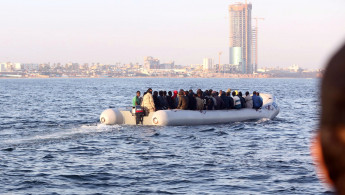EU warns rescuers over 'encouraging refugees' to cross Mediterranean
In announcing more funding for Italy to deal with the hundreds of people reaching the country's shores, Frans Timmermans, the Commission's deputy head, said on Tuesday that organisations' activities might be a "pull factor" - encouraging people to risk their lives in flimsy dinghies in the hope of being picked up and then ferried over to Italy.
Among the proposals for EU ministers to discuss on Thursday, was that Italy draft a code of conduct for non-governmental organisations (NGOs) running rescue services off Libya.
The Commission also called for bolstering Libya's coastal rescue services - something Europeans hope may curb the number of people picked up close to shore by international charities.
Despite criticism of abuses at the hands of coastguards employed by Libya's shaky, UN-backed government, European officials argue that better local rescue services would mean more migrants being taken back to Libya or perhaps to neighbouring Tunisia or Egypt.
Human rights groups have been critical of EU governments, noting a jump in the death rate and more than 2,000 drownings so far this year off Libya; many want Europe to give safe passage to refugees, though some governments fear this would boost their anti-immigration opponents.
Human Rights Watch said a similar set of proposals agreed on Sunday by the Italian, French and German governments along with the Commission "fall far short" and were "awful for people fleeing Libya" and its "abusive conditions ... and conflicts".
It said France and Spain could help by having rescue ships dock there, rather than in Italy, where more than 85,000 people have arrived so far this year. Paris and Madrid have responded cautiously to Italy's warning that it might close its own ports.
Timmermans and Commission President Jean-Claude Juncker called on other member states to make good on two-year-old pledges to take in more refugees from Italy and Greece. An EU deal with Turkey last year has staunched flows that saw a million people reach Greece in 2015 but numbers reaching Italy from anarchic Libya are higher than last year.
"The focus of our efforts has to be on solidarity – with those fleeing war and persecution and with our Member States under the most pressure," Juncker said in a statement.
"At the same time, we need to act, in support of Libya, to fight smugglers and enhance border control to reduce the number of people taking hazardous journeys to Europe."
The Commission reaffirmed its readiness to mobilise EU agencies and personnel to help the Italians.
It said a 46-million-euro project with Italy would bolster Libya's ability to make good on promises to help curb migrant traffic.
The EU also pledged to step up or otherwise enhance a range of other measures, including deportations of failed asylum-seekers, combat smuggling networks and fund African countries from which people are fleeing poverty hoping for work in Europe.
Italy, the Commission said, should speed up its processing of asylum claims and deportations of those rejected.





 Follow the Middle East's top stories in English at The New Arab on Google News
Follow the Middle East's top stories in English at The New Arab on Google News
![Both Hamas and the Palestinian Authority welcomed the ICC arrest warrants [Getty]](/sites/default/files/styles/image_330x185/public/2024-11/GettyImages-2178351173.jpg?h=199d8c1f&itok=TV858iVg)

